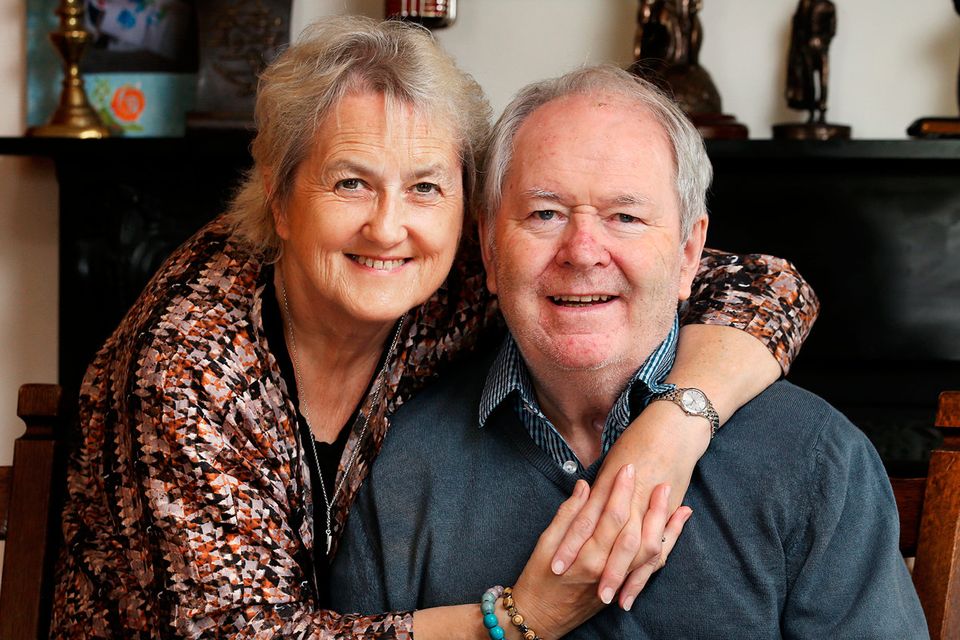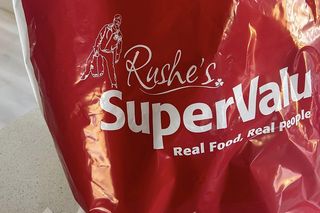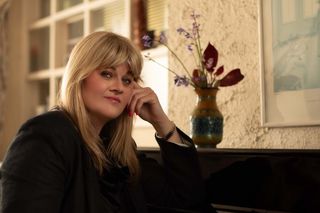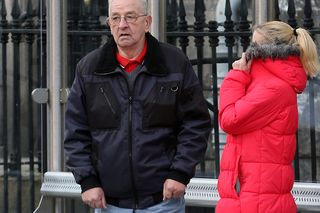Valerie battles her own Greek tragedy and retells the history of ploughing
Reporter Valerie Cox has faced some very tough challenges but she has overcome every one
'I have never kowtowed to anybody': Valerie Cox and her husband Brian at their home in Wicklow Photo: Steve Humphreys
As an old-style reporter Valerie Cox has never been the story herself until now, when she least expected it.
The former RTE journalist has opened up about her battle to rescue her husband Brian after a near-death experience while they were working with migrants on a Greek island.
Despite almost two years of constant crisis, Cox has also managed to write a book on what has become the pivotal annual event for rural Ireland, 'The Ploughing'. But promoting her book, A Ploughing People, has also opened up her own private life, her departure from a job she loved in RTE, and her husband's chronic illness which left him fighting for his life in hospitals in Athens and Dublin.
"I was forcibly retired; I didn't want to retire and I couldn't see any reason to retire," says Cox, emphatically. "The kids are reared and life is an awful lot simpler and I just loved my job so much. All my life I've loved newspapers and radio... I got moved around, but I accepted it, because it was a great job."
RTE is a semi-state organisation and the financial crisis has led to a diktat that once members of staff reach the age of 65 they're out the door.
Like most people, Valerie Cox and her husband Brian had seen the migrant crisis washing over the Greek islands on television. In September 2015, while watching a news programme, the shocking image of the body of the little boy Alan Kurdi being washed ashore brought the story up close and personal for the Coxes.
They had planned a holiday in Norway for the following week, but horrified by the unfolding crisis Valerie remarked to Brian: "You would feel like going out there yourself and doing something" - and in that moment they looked at each other, cancelled the holiday and set out for Greece.
As a reporter Valerie criss-crossed Ireland for a variety of radio stories, she'd covered the tsunami in Sri Lanka, the fall-out from Agent Orange in Vietnam and other world events. Things don't easily faze her. But what was about to happen in their lives would dwarf her previous experiences. She was about to become involved in a titanic struggle for the life of her beloved husband - which took all of her considerable energy.
After their first trip to Greece, she and Brian returned to the islands of Kos and Leros in January 2016 and what they found was "fecking appalling". The migrants washed up dead and alive. "On the last morning we went to eight funerals, including three children, and nobody could say who their mothers were." Later they worked in a migrants' squat in Athens where 190 people had two gas rings to cook for themselves.
Their next trip was to the island of Chios to work in a refugee camp. "Sometimes it would get to you," she says, recalling an image of a mother who had nothing, breastfeeding her baby. Valerie had to take off her sandals and give them to her.
Every morning the camp workers would gather to decide who was doing what that day. On a morning in April 2016, Brian told her he wasn't feeling well. He was dizzy the following day and in a little 'cottage' hospital he was eventually told he'd had a stroke. He then suffered a brain seizure in the hospital. "It was the most frightening thing I have ever seen in my life," says Valerie. "He kept saying 'help me, help me', and there was nothing we could do."
As Brian slipped in an out of consciousness, a decision was taken to put him in a coma. Valerie knew she had to get him off the island to Athens to a well-equipped hospital.
"The good part of this story was that I'd taken out €95 travel insurance with Laya Healthcare - it's cost them about €350,000 to date," she said.
Flown by air ambulance to Athens, the couple got a police escort to the intensive care unit in a hi-tech hospital. "I remember feeling numb, but I never thought he was going to die," she says.
As their grown-up family and friends flew to Athens, Brian was diagnosed with herpes viral encephalitis - basically a cold sore that for two people in a million turns into a virus that attacks the brain. In a majority of cases this virus kills the victim.
"Brian should have died," says Valerie, but she and her children, Brian, Emily, Eoin, Maeve and Aengus, and friends were determined he was not only going to survive, but they were going to get him home.
Brian was brought back to St Vincent's Hospital in Dublin by air ambulance where he spent the next 14 months.
Valerie is full of praise for Brian's consultant, Professor Chris McGuigan, but admits she had to fight and argue and defy the medical team numerous times to get what they believed was the best care for Brian.
"I have never kowtowed to anybody, I don't take it from anybody," says Valerie on the conflicts that arose about his care and his future.
Brian, a teacher and former head of Notre Dame School in Rathfarnham, Dublin, was 73 and she was told: "You must accept Brian has had a wonderful life."
"I was always determined that he was going to come home and we weren't going to write him off, even in those awfully dark days," she says.
Even as she was fighting for Brian's future she was busy with her new book. A Ploughing People is a celebration of the history of what has evolved into the Ploughing Championship, which takes place in Screggan, Co Offaly. (This year's event begins on September 19.)
"I was getting up at 5am and going to different parts of the country to meet people involved in ploughing and then going in to St Vincent's in the evening to sit with Brian, who was unconscious and had tubes sticking out of him from all angles.
"I was sitting by Brian's bed writing the book between October 2016 and last April. It was very intense, especially because of what was happening with Brian, but I got some great help.
"The people I met in ploughing are just wonderful, we had such great times even when things were very dark in my life," she says.
Brian finally regained consciousness, but then the family came under pressure to free up the bed by putting him into a home.
Because he was over 65 there was no place for him in rehabilitation.
Eventually, the solution was found - he got a place in the rehab section of Leopardstown Park Hospital in south Dublin. "They said 'we think we can make a difference, get him over here and get him here fast' and we got him there immediately."
When Brian finally returned home to Brittas Bay, Co Wicklow (on August 17) after 16 months, he was "95pc right". His voice is perfect and he has regained his fluency in Irish and German, although he is still working on getting his fingers to use his mobile phone. About 120 people - a mix of family and friends - assembled for a welcome-home party for Brian.
But Valerie doesn't have much time to sit back and bask in this triumph. She'll be at the Ploughing Championship to promote her book.
And she also has her eye on RTE - Valerie wants to go back to one of her first jobs in radio, doing It Says In The Papers in the early morning. "I just loved doing that job," she says with undimmed enthusiasm.
'A Ploughing People' by Valerie Cox is published by Hachette Books
Join the Irish Independent WhatsApp channel
Stay up to date with all the latest news















